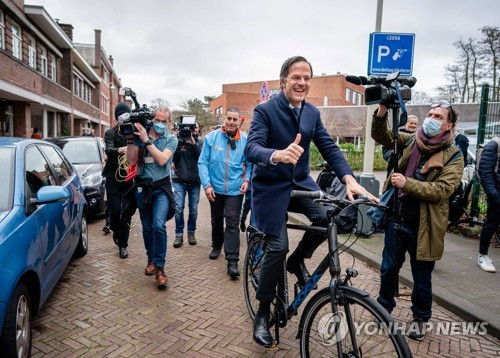Dutch general election exit survey… Prime Minister Ruther’s Liberal Democratic Party Majority Expected
The personality of a referendum for’response to the pandemic’… Prime Minister Ruther expects 4th term of office
 viewer
viewer
In the Dutch general election, which ended on the 17th (local time), the results of an exit survey that the center-right Liberal Democratic Party (VVD) led by Prime Minister Mark Luther will take the most seats came out. If VVD maintains the position of the ruling party and Prime Minister Ruther succeeds in forming a coalition, he will continue his fourth term and become the longest-running Prime Minister.
According to Reuters and the like, VVD is expected to take 35 seats out of 150 seats in the House of Representatives as a result of the exit survey of the general election held for three days from the 15th to the same day. Following the pro-European party, the 66 Democratic Party (D66) took second place with 27 seats, and the Liberal Party (PVV) led by the anti-Islamic far-right politician Heit Wilders (PVV) lost three seats compared to the previous seats, ranking third. It was expected to occupy.
When the VVD becomes the first party as a result of the final counting, Prime Minister Luther will lead the negotiations for the formation of the next ruling coalition government. If he succeeds in forming a coalition, he will be able to continue his fourth term of office and become the country’s longest-serving prime minister.
The Netherlands is a multi-party country with many political parties. Prime Minister Luther, 54, formed a coalition government this year and continued his third term in office after becoming prime minister in 2010. After German Chancellor Angela Merkel and Hungarian Prime Minister Victor Orban, he is one of Europe’s longest-serving leaders.
This general election was originally scheduled for one day, but it took place over three days to maintain social distancing within the polling place due to the spread of the novel coronavirus infection (Corona 19). This election was the first general election held this year in Europe, where blockade continues, and was regarded as a referendum on the Dutch government’s response to Corona 19.
The Dutch government, led by Prime Minister Lüther, resigned in January due to a childcare subsidy scandal, and remained in the administrative role until the general election. In the Netherlands, more than 16,000 people have died from Corona 19, and strict containment measures continue.
The Dutch government forced bars and restaurants to close from mid-October last year, and in January this year introduced a night curfew for the first time since World War II. However, many voters are supporting Prime Minister Luther’s response to Corona 19, so it was predicted that he could continue his fourth term before the election. VVD also showed a large dominance in previous polls.
A whopping 37 political parties participated in this year’s general election, and 17 of them are expected to get enough votes to secure at least one seat. Accordingly, negotiations to form a new coalition government are expected to be a difficult process over several months. In order for Prime Minister Luther to form a coalition, it appears that he will have to cooperate with at least two other political parties to secure 76 seats.
As of this afternoon, the turnout was 81%. It was 82% four years ago. However, in this election, the elderly were allowed to vote by mail, and the voting period was three days in total. The counting work is scheduled to take place overnight.
Prime Minister Ruther said, “The main question in this election is who will lead this country through the Corona 19 crisis and make a new start?”
/ Reporter Kihyuk Kim [email protected]
< 저작권자 ⓒ 서울경제, 무단 전재 및 재배포 금지 >
